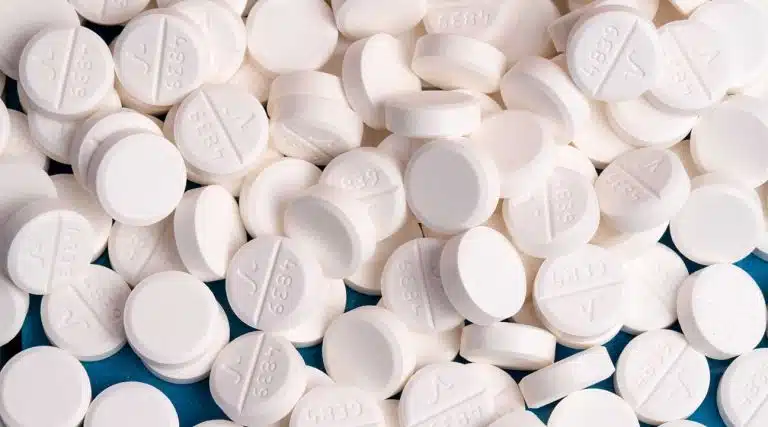Is Oxycodone An Opiate Or Opioid?

Chances are you or someone you know has been prescribed oxycodone, the active ingredient in several pharmaceutical pain relievers. Oxycodone is an opioid found in pharmaceuticals like OxyContin, Percocet, and Vicodin.
Oxycodone is a semi-synthetic opioid that is used to treat moderate to severe pain.
When you think of opioids, the word opiates might also come to mind. We sometimes think the two words can be used interchangeably, and they often are, but there is also a subtle difference.
Is Oxycodone An Opiate?
Because of how oxycodone is produced, it’s technically not an opiate.
Opiates are naturally occurring substances that come from poppy plants. They include morphine, codeine, and opium and have been used as pain relievers for centuries. Opiates fall under the umbrella of opioids and they attach to the opioid receptors in your brain.
Opioid receptors are responsible for pain and pleasure. Although opiates are naturally occurring substances, they produce the same effects as synthetic opioids and have the same potential for abuse.
Is Oxycodone An Opioid?
Opioids include any naturally occurring, synthetic, or semi-synthetic drugs like oxycodone that interact with the body’s opioid receptors to alleviate moderate to severe pain. Just like opiates, synthetic and semi-synthetic opioids interact with opioid receptors in the brain.
Drugs like oxycodone affect the reward system in the brain responsible for producing dopamine. The increase in dopamine from taking prescription opioids or natural opiates can lead to physical and mental dependence.
Opioid Addiction
As of 2018, the Substance Abuse and Mental Health Services Administration found that oxycodone was the second most abused prescription drug in our nation.
Opioids can cause physical dependence and overdose when misused or taken for any period of time. Physical dependence occurs because the body develops a tolerance to the drug.
Over time, more of the opioid is required to produce the same pain-relieving effects. Opioids also affect the mind because they produce intense feelings of euphoria when it releases dopamine in the brain. The overabundance of dopamine affects the brain psychologically when you stop taking the medication.
Opioids are also dangerous because they decrease respiration, blood pressure, and heart rate. The longer you take any of these medications, the greater your tolerance becomes, which can increase the risk of misuse and overdose.
Withdrawal Symptoms
It’s important to know the warning signs of physical dependence so you can have a plan to safely taper off of any opioids. Oxycodone withdrawal starts within hours after taking the last dose and the physical symptoms last about a week.
Here are common physical symptoms of opioid withdrawal:
- body aches
- diarrhea
- sweating
- high blood pressure
- chills
- runny nose
Psychological symptoms of opioid withdrawal often outlast the physical detox and may require further treatment to prevent relapse.
Here are common psychological symptoms of withdrawal:
- anxiety
- depression
- agitation
- difficulty concentrating
- cravings
- insomnia
- suicidal thoughts
Treatment For Opioid Addiction
Addiction to oxycodone and other opioids is important to address as soon as possible because of the high risk of overdose.
Detox programs can address physical dependence and withdrawal with short-term medical supervision. Residential and outpatient facilities help treat the psychological effects of opioid use disorder.
If you think you or a loved one is experiencing opioid addiction, please contact one of our treatment specialists today.
Written by Ark Behavioral Health Editorial Team
©2024 Ark National Holdings, LLC. | All Rights Reserved.
This page does not provide medical advice.
Centers for Disease Control and Prevention (CDC) - Commonly Used Terms | Drug Overdose
Substance Abuse and Mental Health Services Administration - Key Substance Use and Mental Health Indicators in the United States: Results from the 2018 National Survey on Drug Use and Health
U.S. National Library of Medicine: MedlinePlus - Oxycodone

Questions About Treatment?
Ark Behavioral Health offers 100% confidential substance abuse assessment and treatment placement tailored to your individual needs. Achieve long-term recovery.
100% confidential. We respect your privacy.
Prefer Texting?
Our friendly support team is here to chat 24/7. Opt out any time.

People Also Read
- Oxycodone Side Effects
- Is Codeine An Opioid?
- Is Hydrocodone An Opioid Or Opiate?
- Is Methadone An Opiate?
- Is Fentanyl An Opioid Or Opiate?
- How Long Is Oxycodone In Your System?
- Oxycodone Overdose
- Oxycodone Withdrawal
- Is Fentanyl An Opioid Or Opiate?
- Oxycodone Warnings
- Street Value of Opioids
- What Drug Schedule Is Oxycodone?
- Is Oxycodone A Narcotic?






 Learn More
Learn More








